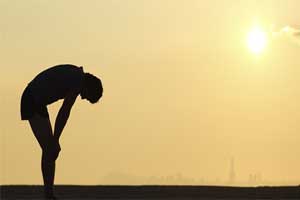- Home
- Editorial
- News
- Practice Guidelines
- Anesthesiology Guidelines
- Cancer Guidelines
- Cardiac Sciences Guidelines
- Critical Care Guidelines
- Dentistry Guidelines
- Dermatology Guidelines
- Diabetes and Endo Guidelines
- Diagnostics Guidelines
- ENT Guidelines
- Featured Practice Guidelines
- Gastroenterology Guidelines
- Geriatrics Guidelines
- Medicine Guidelines
- Nephrology Guidelines
- Neurosciences Guidelines
- Obs and Gynae Guidelines
- Ophthalmology Guidelines
- Orthopaedics Guidelines
- Paediatrics Guidelines
- Psychiatry Guidelines
- Pulmonology Guidelines
- Radiology Guidelines
- Surgery Guidelines
- Urology Guidelines
Golden hour - Key to successful management of heat stroke

India: Exertional heat stroke (EHS) is a life-threatening medical emergency, which if not treated in time can result in death due to organ damage across all body system. A report published in the Journal of the Association of Physicians of India presents the experience of some physicians from the peripheral hospital of northern India of treating nine patients of EHS and their successful outcome.
Dharmesh Soneji, Consultant Med. and Medical Oncology, HOD, MDTC, Army Hospital Research and Referral, New Delhi, and colleagues, based on their experience of treating these patients, stress on the importance of golden hour concept of heat stroke management.
"Time to start treatment is the most important factor in deciding outcome as it is for acute myocardial infarction. Immediate start of treatment improves outcomes," they explain. "Evaporative cooling is the field method of cooling and can be used where ice water immersion facility is not available."
Total of 24 patients brought post exercise with heat-related illness in the month of August and September. Out of these cases, nine were diagnosed as EHS with a median age of 30 years.
Also Read: Heat Stroke Manifesting as Cardiac Arrest and Multi-Organ Failure
Key Observations:
- All patients were delirious at presentation with seizures in 18% of cases.
- One patient had acute renal failure requiring hemodialysis for 6 weeks.
- All patients survived without any residual functional or neurological impairment.
- One patient suffered from rebound hyperthermia during the course of treatment.
- Three patients went on to develop mild hypothermia which recovered subsequently, possibly benefitting with mild hypothermia.
- Six patients (66%) patients developed hypocalcaemia and lactic acidosis.
Also Read: In Exertional Heat Stroke, “Cool First, Transport Second”
Treatment
Treatment started immediately with aggressive and rapid evaporative cooling. Patients were made naked, covered with wet cotton sheet and continuously cold water was splashed. Combination of other methods were used for nonresponding patients with ice packs put over inguinal and axillary regions. Gastric lavage with ice cold water used for one patient.
Continuous rectal temperature monitoring done and temperature brought to 99°F within 45 minutes to one hour. Fluid management was an integral part of management. Urine output of 50 ml/ hr was maintained. Three patients had decreased urine output of < 30 ml/ hour. They were treated with high ceiling diuretic inj Furosemide 10 mg to prevent myoglobin induced renal failure.
Rapid cooling is the treatment for EHS. Ice Cold Water Immersion is the method of choice but it is not readily available and practical issues are associated with it. In practice, a combination of various methods is used. All patients were paratroopers and evaporative cooling method was used immediately upon reception of patient. They also reported similar experience with no mortality.
"The end point of cooling is a matter of debate, the lower threshold of 99°F should be prospectively studied in future clinical studies," concluded the authors.
For further reference follow the link: http://www.japi.org/january_2019/029_corr_exertional_heat_stroke.pdf

Disclaimer: This site is primarily intended for healthcare professionals. Any content/information on this website does not replace the advice of medical and/or health professionals and should not be construed as medical/diagnostic advice/endorsement or prescription. Use of this site is subject to our terms of use, privacy policy, advertisement policy. © 2020 Minerva Medical Treatment Pvt Ltd